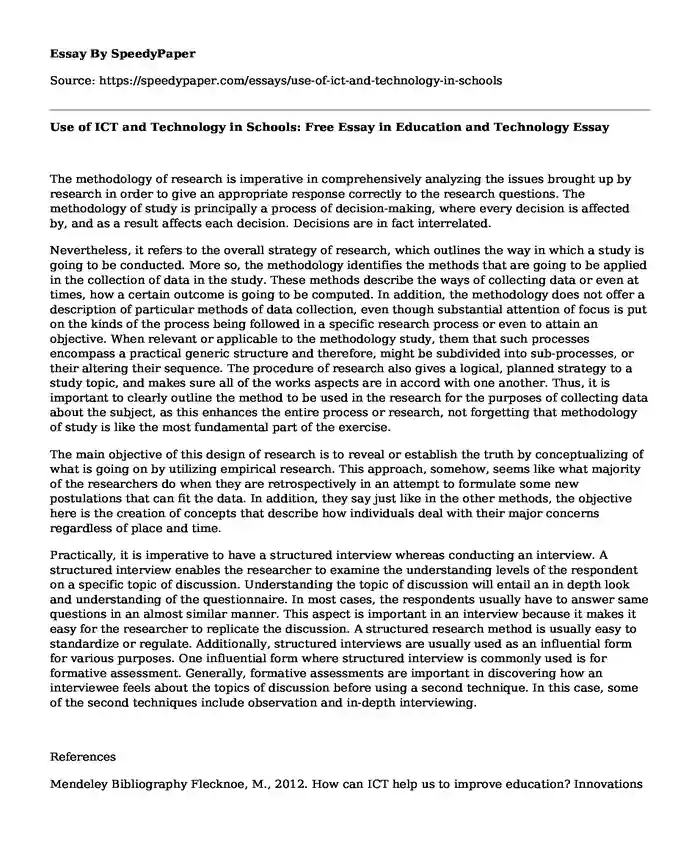
| Type of paper: | Essay |
| Categories: | Education Information technologies |
| Pages: | 3 |
| Wordcount: | 636 words |
The methodology of research is imperative in comprehensively analyzing the issues brought up by research in order to give an appropriate response correctly to the research questions. The methodology of study is principally a process of decision-making, where every decision is affected by, and as a result affects each decision. Decisions are in fact interrelated.
Nevertheless, it refers to the overall strategy of research, which outlines the way in which a study is going to be conducted. More so, the methodology identifies the methods that are going to be applied in the collection of data in the study. These methods describe the ways of collecting data or even at times, how a certain outcome is going to be computed. In addition, the methodology does not offer a description of particular methods of data collection, even though substantial attention of focus is put on the kinds of the process being followed in a specific research process or even to attain an objective. When relevant or applicable to the methodology study, them that such processes encompass a practical generic structure and therefore, might be subdivided into sub-processes, or their altering their sequence. The procedure of research also gives a logical, planned strategy to a study topic, and makes sure all of the works aspects are in accord with one another. Thus, it is important to clearly outline the method to be used in the research for the purposes of collecting data about the subject, as this enhances the entire process or research, not forgetting that methodology of study is like the most fundamental part of the exercise.
The main objective of this design of research is to reveal or establish the truth by conceptualizing of what is going on by utilizing empirical research. This approach, somehow, seems like what majority of the researchers do when they are retrospectively in an attempt to formulate some new postulations that can fit the data. In addition, they say just like in the other methods, the objective here is the creation of concepts that describe how individuals deal with their major concerns regardless of place and time.
Practically, it is imperative to have a structured interview whereas conducting an interview. A structured interview enables the researcher to examine the understanding levels of the respondent on a specific topic of discussion. Understanding the topic of discussion will entail an in depth look and understanding of the questionnaire. In most cases, the respondents usually have to answer same questions in an almost similar manner. This aspect is important in an interview because it makes it easy for the researcher to replicate the discussion. A structured research method is usually easy to standardize or regulate. Additionally, structured interviews are usually used as an influential form for various purposes. One influential form where structured interview is commonly used is for formative assessment. Generally, formative assessments are important in discovering how an interviewee feels about the topics of discussion before using a second technique. In this case, some of the second techniques include observation and in-depth interviewing.
References
Mendeley Bibliography Flecknoe, M., 2012. How can ICT help us to improve education? Innovations in Education & Teaching International, 39(4), pp.271280.
Halverson, R. & Collins, A., 2006. Information technologies and the future of schooling in the United States. Journal of Research and Practice in Technology Enhanced Learning, 1(2), pp.145156.
Hollingworth, S. et al., 2008. Technology and school improvement: Reducing social inequity with technology?, London, UK: British Education and Communications Technology Agency (BECTA).
Ilomaki, L., 2008. The effects of ICT on school: teachers and students perspectives. University of Turku.
Mooij, T., 2007. Design of educational and ICT conditions to integrate differences in learning: Contextual learning theory and a first transformation step in early education. Computers in Human Behaviour, 23(3), pp.14991530.
Moyle, K., 2012. Differentiated classroom learning, technologies and school improvement: What experience and research can tell us, Sydney.
Cite this page
Use of ICT and Technology in Schools: Free Essay in Education and Technology. (2019, Jun 21). Retrieved from https://speedypaper.net/essays/use-of-ict-and-technology-in-schools
Request Removal
If you are the original author of this essay and no longer wish to have it published on the SpeedyPaper website, please click below to request its removal:
- Comparative Analysis Essay Sample on Two Articles about Fast Food
- Deng Xiaoping's Reforms of Chinese. Essay Sample.
- The Avengers - Free Essay on the Movie
- Essay Example on Liberalism and Realism in the Movie Dr. Strangelove
- Personalized Healthcare. Free Essay Example.
- Covering International News
- Essay on Revolutionizing Healthcare: An In-Depth Analysis of Additive Manufacturing in CT Scan Machines
Popular categories




